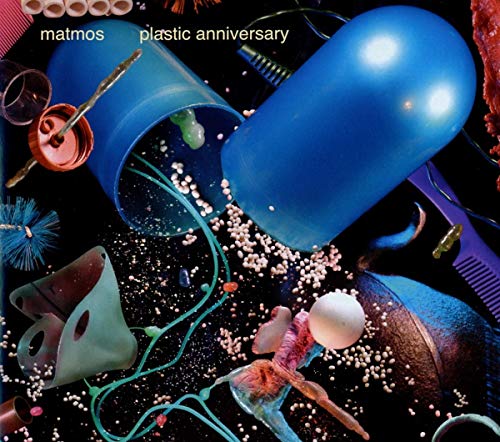
Matmos
Plastic Anniversary
Release Date: Mar 15, 2019
Genre(s): Electronic
Record label: Thrill Jockey
Music Critic Score
How the Music Critic Score works
Buy Plastic Anniversary from Amazon
Album Review: Plastic Anniversary by Matmos
Excellent, Based on 9 Critics
Based on rating 9/10
With Plastic Anniversary, Matmos' Drew Daniel and M.C. Schmidt celebrate 25 years of romantic and creative partnership. While this might be a silver anniversary for almost any other couple, in this case plastic is much more apt: Not only does it echo their relationship's durability, it reflects the dedication to transformation at the heart of their music.
Based on rating 4.5
Plastic, in so far as it connotes the artificial, is in many circles an insult. There is a struggle for the authentic, a perception of the real and the faux that prizes music that can be described as 'rootsy', and for a time this permeated alternative electronic music - remember folktronica? But since then there has been an embrace of the synthetic, with artists like SOPHIE and Jlin transforming the zeitgeist to such an extent that working with foley could be seen as old-hat. This is where Matmos come in, a duo that have been constructing weird and wonderful soundworlds from unlikely sources for 25 years, hence the eponymous anniversary.
Based on rating 4/5
• Matmos: Matmos starts out, right off the bat, by recording the nervous system of a crayfish. I don’t know how to do that. I’m not even completely sure what a crayfish is. • Quasi-Objects: A record made entirely out of everyday objects, if among your everyday objects you include a whoopie cushion and a banjo. • The West: Recorded with old-timey instruments in a new-timey way, i.e.
Based on rating 8/10
Sometimes it's the pure novelty of a Matmos album that makes it so enjoyable. Sometimes it's that same novelty that makes it hard to separate the medium from the message. On Plastic Anniversary, the Baltimore duo aren't afraid to triumphantly straddle the line between these two truths. After recording albums by sampling surgical instruments and a washing machine, Drew Daniel and MC Schmidt celebrate their 25th anniversary as a couple (and the plastic jockstrap that brought them together) by crafting an full-length made entirely from ….
Based on rating 7.6/10
Each Matmos album has a concept of some kind--music paying tribute to queer icons, music made from the sounds of an operating room, music made through telepathy. It's easy to get caught up in the audacity of it all and marvel at how formal limitations can lead to such emotional work. The knowledge that, say, a deeply moving piece of drone music was sourced from the sound of a bow drawn across the wires of a rat's cage--empty, because the rat had recently died--has several layers of poignancy.
Based on rating 3.6/5
Drew Daniel and Martin Schmidt have spent the last quarter century making music as Matmos, a group whose style Daniel once described as "noisy electronic music often made with unusual sources." Those sources have included everything from "the snips, clicks, snaps, and squelches of various surgical procedures," to simpler fare like washing machines and shuffled playing cards (they did that one live on tour for Björk, with whom they produced the albums Vespertine and Medúlla). Matmos's latest LP, Plastic Anniversary, marks their 25th as both a musical duo and a couple. The chosen sound source this time is plastic, which feels like the perfect subject for a Matmos album.
Based on rating 6/10
Plastic Anniversary is the newest addition to Matmos ' ever-growing canon of unconventional sample-based concept records. Following on from 2016's critically acclaimed Ultimate Care II (an album made entirely of washing machine samples) Matmos ' latest effort sees them embracing a slightly less limited sound palette - plastic. The field recording virtuosos have built this record from samples of anything and everything plastic, ranging from exercise balls to pool balls, vinyl records to bubble wrap and bins to breast implants, and this very mixed bag of materials has produced some similarly mixed results.
Opinion: Excellent
Photo by Theo Anthony "I see a great future in plastics." It's been more than half a century since The Graduate, and the outlook for plastics is no longer quite so rosy. Greenpeace estimates that 8.3 billion tons of plastic has been produced since the 1950s—a whopping 79% of which has ended up in landfills or elsewhere in the environment. The ocean, in particular, takes in about 12.7 million tons of plastic, and as a result some 700 marine species are affected by it.
Opinion: Excellent
In the 150 years since John Wesley Hyatt patented celluloid, the first commercially viable, mass-produceable thermoplastic, the spread of artificial polymers and malleable artificial compounds throughout the earth is approaching catastrophic levels. A 2015 study in the journal Science put the annual toll on the world's oceans at somewhere between 1.1 and 8.8 million metric tons. Picture, for a moment, eight million Toyota Prius's worth of takeaway containers, mineral water bottles, broken electrical appliances, vehicle fuel tanks, crisp packets, playground fixtures, and faux-wood planks.
'Plastic Anniversary'
is available now

